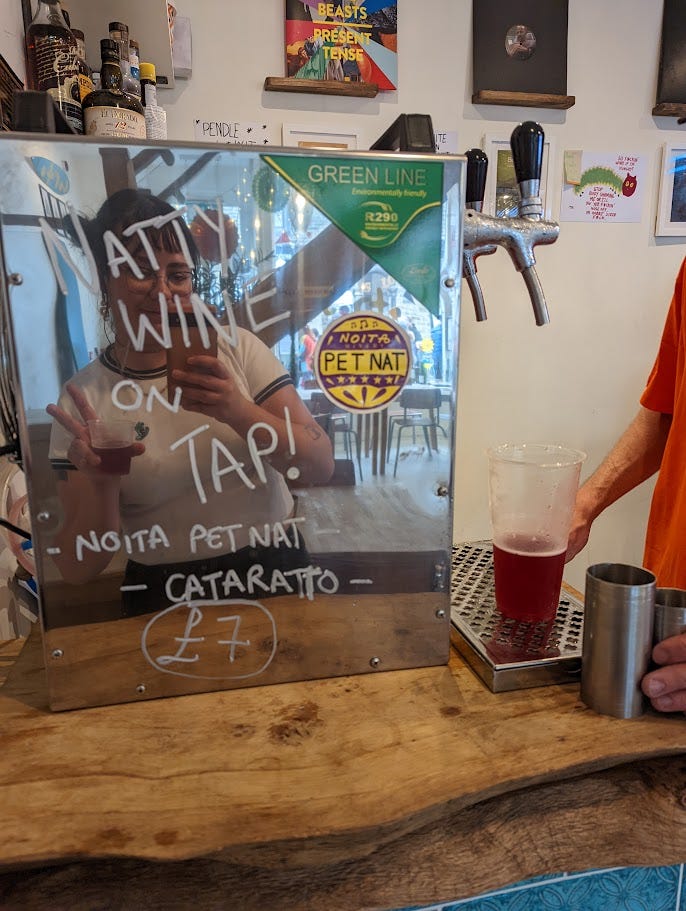During the pandemic, I joined in with a micro-craze that all my UK-based wine nerd friends were participating in—I bought a bagnum of orange wine.
A bagnum is a plastic pouch with a tap fixed to it. Basically, it’s a Bag-In-Box, or more literally, a bag-without-box, that for some reason captured imaginations like no other wine fad that year. Call us starved of things to do in 2020, but I really think Le Grappin, the originators of the fad, managed to grasp something exciting. Orange wine, which to many was an unfamiliar treat at the time, in a bag. It just felt fun and accessible. It had a little handle. It was simple. More importantly, the wine was pretty good too.
Le Grappin don’t appear to still sell their orange wine in bagnum format anymore, but their rosé, white and red wines are still going strong. Jancis Robinson is quoted on their website as saying “The finest wine I have encountered in a pouch are Le Grappin’s burgundies…” an incredibly specific compliement, given there are about three makers on the market using pouches or bagnums, but I’ll let them have it.
It confuses me why more winemakers don’t use pouches or bagnums—or why other drinks makers don’t use them either, come to think of it. I was happy to see Wishbone Brewery, a small independent brewery based in Keighley, West Yorkshire, trialling real ale pouches for Christmas rather than using cumbersome, expensive minikegs. They make sense. They’re light, easy to fill, easy to use, easy to fit in your fridge, less ridiculous-looking than a big glass magnum bottle, and have a lower carbon footprint than single-use glass… there is only one downside for me, and that’s their recyclability. They can’t, they won’t, so don’t try to recycle them.
Glass bottles make up around half of a winery’s carbon emissions, thanks to the effort it takes to ship the empties to the cellar, then to package up and ship the bottles out again once filled. They are heavy, breakable, and while they’re still industry standard because of their traditional use, they’re far from a perfect solution. I’ve been happy to see winemakers using kegs to sell wine in bars—why not? I used to sell Judith Beck’s Ink from a Lindr machine and it worked a treat. Beautiful wine sold efficiently, accessibly, and with less impact on the planet. I don’t see a problem with it at all.

I’m always keeping an eye out for glass bottle alternatives being used, and this news story from the San Francisco Chronicle on California Nouveau wines caught my eye. Family-owned and run winery Extradimensional Wine Co. Yeah! is releasing their take on Beaujolais Nouveau with their own Mourvedre-Primitivo rosé and a Chenin-Roussanne-Viognier blend, made to be enjoyed young. I want to drink them very much. These wines are being sold in refillable, reusable Kleen Kanteen bottles, which are themselves made from 90% recycled steel. You can’t age a wine in stainless steel, but it’s the perfect way to carry your nouveau around until you’ve drank it. They’re not meant to stick around anyway.
What I like about the Kleen Kanteen idea is that the bottles are engraved—no doubt stealing the idea from Tom and I when we did the same for a pair of wedding present Kanteens for our friends. (Obviously the Extradimensional Wine Co. Yeah! Kleen Kanteens were not engraved at the Timpson’s in Kendal like ours, because they don’t have mistakes on them.) They’re just like growlers—remember those? I’ve got at least two hidden in the kitchen somewhere, stainless steel and engraved, once filled at a tap room and then never refilled again. With beer, though, it’s fizzy. It’s not ideal for a refillable situation. Wine, on the other hand is perfect for a BYOB set-up—they manage perfectly well in mainland Europe to refill their own wine receptacles and have their beer bottles reused by the breweries too. Are fancy water bottles how we crack it? Can wine encourage a more habitual refill lifestyle than beer managed to achieve here in Britain if only they choose the right refillable bottles?
Other Stuff
Shoreditch wine bar Leroy closes. "Despite what our government may think, this is a noble profession and indeed any small business owner has our enduring respect."
Young Chinese people are accessing information and studying at free lectures in local pubs, while freedom of expression shrinks within schools and universities. “It’s actually tough for us to air any political views in class – unless they’re extremely mainstream and unshakable… But in the pub, a place without authority… People are more likely to speak their mind.”
Writers who came to my workshop—if you want a great example of how to write an overwrought, self-serving, breathlessly pretentious feature that digs no deeper into areas that require obvious scrutiny such as mentions of statutory rape and grooming, this is how you do it. I have one question. WHO EDITED THIS?
“Do Italians not have bowls?” The fussiness of pasta making, by Jaya Saxena
Malt. It’s important. Pete Brown visits Baird’s Malt and talks sustainability and climate change for Pellicle.




